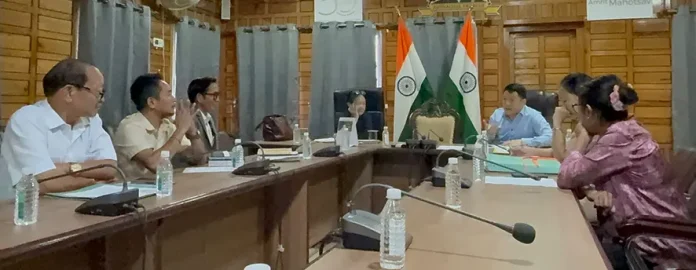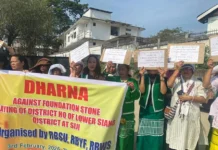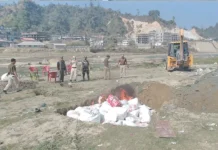YUPIA, 8 Aug: The Papum Pare narcotics coordination (NCORD) committee met at the DC’sconference hall here on Friday to review the action taken since the 13 June meeting, and to address emerging challenges in the fight against drugs.
SP Taru Gusar raised alarm over the rising cases of HIV and hepatitis among arrested drug addicts, warning, “We are sitting on a ticking time bomb. If not tackled seriously, the ICR will become a hub for these diseases.”
He called for united efforts and greater community participation to tackle the menace.
Gusar further stated that, “owing to health complications among addicts, many are released prior to the stipulated period.” He emphasised the need for a robust monitoring mechanism to track such cases and facilitate timely medical intervention.
Sagalee ADC Higio Yame recommended promoting dragon fruit and kiwi cultivation as part of alternative development programmes in areas affected by illicit crop cultivation.
Doimukh SDO Kipa Raja highlighted the Railway authorities’ inaction in clearing overgrown bushes along the tracks despite repeated requests and meetings, noting that they serve as “safe havens for drug peddlers, thieves, and other antisocial elements.” He urged the NCORD chairperson to set a strict clearance deadline.
Leporiang CO Chukhu Taba reported heightened vigilance with local cooperation, and announced the installation of an anonymous complaint/drop box for the public to report illegal activities.
The drug control officer confirmed that no Schedule X licences have been issued to pharmacies in Papum Pare, making methadone sales illegal in the district.
Schedule X is a category under the Drugs and Cosmetics Rules, 1945 that lists certain medicines which have a high potential for abuse or addiction.
As a follow-up to earlier directives, awareness activities have been intensified across the district by the Education and ICDS Departments.
Other key issues discussed during the meeting included monitoring illicit cultivation of poppy and cannabis crops; promoting anti-drug awareness programmes in affected regions; supervising de-addiction and rehabilitation centres; implementing alternative development programmes in areas affected by illicit cultivation of narcotic crops; and upgrading the intelligence sharing methods.(DIPRO)




